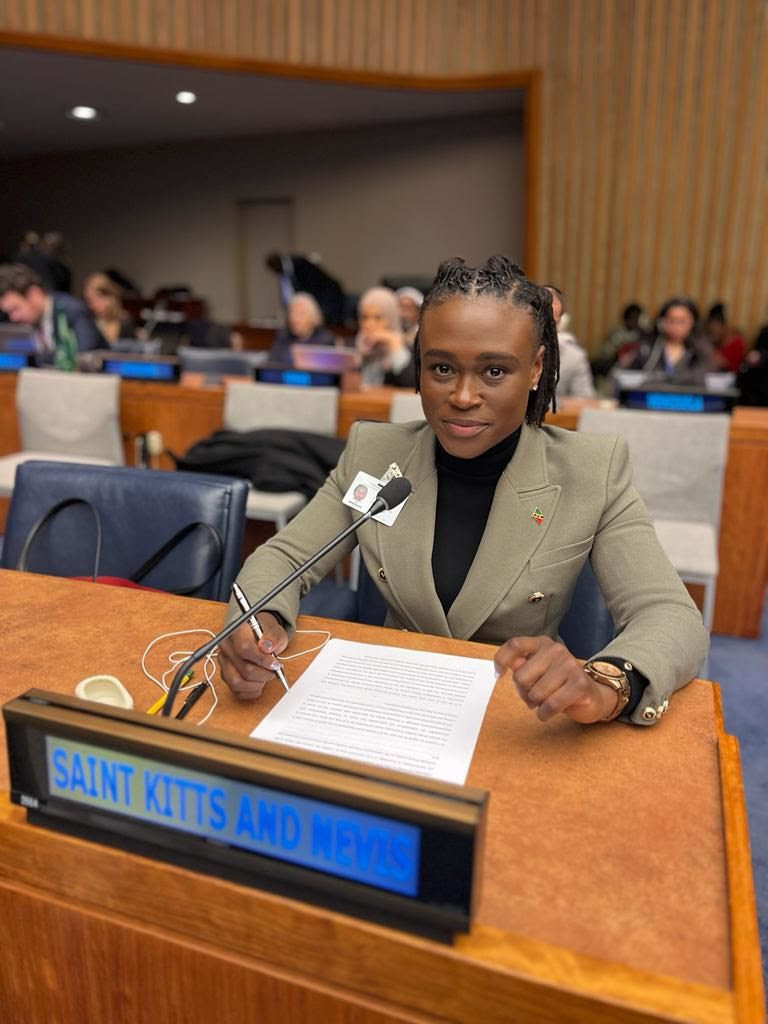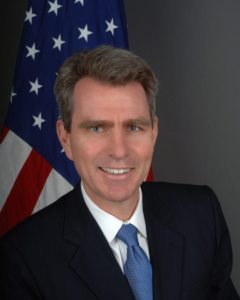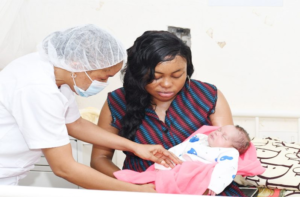Time to weigh impact of abundant technologies – Phillip
THE TIME IS RIPE to begin weighing the impact of an abundance of technologies in pursuit of gender equity and empowerment of women and girls, St Kitts and Nevis Gender Affairs Minister, Senator Isalean Phillips counselled.
“Saint Kitts and Nevis aligns itself with the statement made by The Bahamas on behalf of CARICOM and wishes to offer brief remarks in its national capacity. Considering the rapid pace of change and transformation in technology, it is an opportune time to consider the impacts and effects of the multitude of technologies on the achievement of gender equality and the empowerment of women and girls,” Phillip said addressing the ongoing 67th Session of the Commission on the Status of Women,
As I consider the theme for this year, (‘Innovation and Technological Change and Education in the Digital age for Achieving Gender Equality and the Empowerment of Rural Women and Girls’) the 67th Session of the Commission on the Status of Women, and in the context of the realities of economic, social and political life in St Kitts and Nevis, I am pleased to acknowledge the achievements my government has made in ensuring (information and) telecommunications coverage is provided across the twin-island state whereby internet access is widespread and freely accessible in communities at multipurpose community centres,” Phillip said.
Senator Phillip told participants at the two-week UN-organised forum that Basseterre is making raid progress as it relates to broadband internet expansion, which sees a majority of the population being hooked up to the world wide web.

“St. Kitts and Nevis is doing very well in the expansion of broadband internet connections with over 80 percent of all residents having access to their own fast internet connection.”
In comparison to other states, the senator noted that COVID 19 had tested their reliability and accessibility with regards to technological devices. This, she stressed, has brought the need for standardisation of information and communication technology (ICT) in the education sector.
“As is the case in many other states, the Covid-19 pandemic would have tested the reliability and accessibility of technological devices among the various socio-economic groups and demographics, thereby exposing the need to standardize the use of information and communication technology in schools and incorporate digital devices as a mode of instruction and learning,” the minister explained.
The Corona Virus global pandemic tested the resolve of the young government to install campus-wide internet connectivity at all public schools, but they are prevailing, Phillip told the forum.
“In response to the challenges experienced in teaching during the pandemic, my government has made the commitment to install campus-wide internet connectivity at all public schools, and, to additionally implement a laptop program by providing one free laptop and tablet to students throughout their primary and secondary school life.”
“With this initiative, we seek to leverage digital technologies as a tool for 21st-century teaching and learning by equalizing access between boys and girls and across social and economic class divides,” Phillip explained.
The Gender Affairs Minister admitted that in the federation there have been steady increases in tertiary education for the past five years.
“Fortunately, in St Kitts and Nevis, the engagement and involvement of women and girls in STEM (Science, Technology, Engineer, Mathematics) fields have increased over time to indicate trends where more females graduate high school with higher pass rates in Sciences and Mathematics than their male counterparts.”
“Correspondingly, over the past five years girls’ involvement in engineering has steadily increased in tertiary education with female involvement in robotics increasing to over 50%percent. These trends reflect the increasing pace of inclusion of girls in STEM in St Kitts and Nevis, which is a promising indicator of closing gender gaps that have historically existed in the information and communication technologies,” Phillip said.
Gender disparities in these areas are slowly shifting as the government takes the lead to restructure governing institutions by proactively appointing more women as leaders in parliament, Statutory boards, and in corporations.
In a national climate that is prioritising women’s empowerment through intentional measures, addressing the under-representation of women and girls in science and technology is also enabled by the increased visibility of female managing directors and CEOs of the country’s leading telecommunications companies.
As a Small Island Developing State (SIDS) populated by just over 50,000 nationals and residents, Basseterre is progressing well when it comes to shaping inclusive cultures and representational spaces for women and girls in ICTs and STEM. However, digital divides appear to exist more across generational lines with older persons aged 62 and older being left behind in the technological evolution. Older women are partly affected since females dominate within this age bracket.
“For developing states like St Kitts and Nevis forming the global south, analysis of the burgeoning digital divide cannot be made without highlighting the disproportionate impact of the unequal distribution and ownership of innovative technology and intellectual property. Where North America, Asia, and Europe comprise most of the world’s IT industry with a collective share of 88 percent leaving Africa and Latin America with 6 percent and 5 percent respectively of global tech industry distribution,” Phillip said.
She said “any effort to leverage digital technologies for the enhancement of women and girls must recognise that the spread of opportunities for transformation is unfairly limited for developing countries,” she disclosed.
She said despite national increases in female representation and engagement in the use of the internet and other technologies, there is a clear disparity in the ability of some member states to fully realise the potential for development with digital technologies.
“These inequalities have ripple effects in other areas that impact the lives of women and girls living in developing countries as we experience challenges in accessing better healthcare, employment, and finance for evolution and change. As we engage with each other about shaping inclusive and transformative innovation ecosystems let us not forget the reality of inequality within and among countries that is an inherent part of the international development agenda,”; she argued.
“I urge us to acknowledge that digital equity also requires a geopolitical lens that magnifies divides between the developed and the developing countries as distinguished by unequal creation and distribution of technologies,” the Minister noted.
“May we continue to work together to achieve gender equality and the empowerment of women and girls in all areas,” Phillip said, encouraging participants at the UN meeting.










